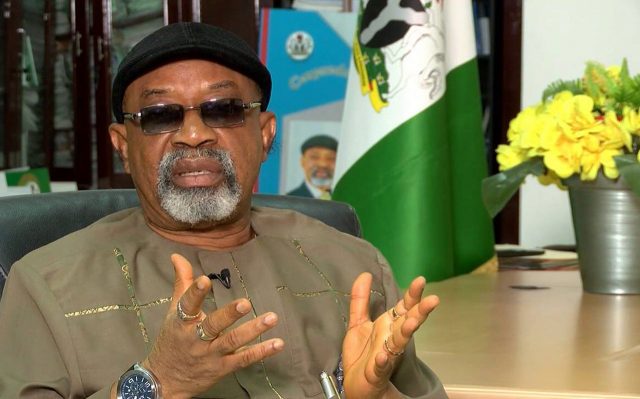The Minister of Labour and Employment, Sen. Chris Ngige, on Tuesday, said voluntary conciliation was adopted to ensure a quick resolution of the strike by the Academic Staff Union of Universities (ASUU).
Ngige made this known at a three-day capacity-building workshop on International Labour Standards and Dispute Resolution in Nigeria in Abuja.
The workshop is organised by the Industrial Arbitration Panel (IAP) in collaboration with the International Labour Organisation (ILO).
The minister said voluntary conciliation was adopted instead of arbitration in order not to delay the resolution process with the striking lecturers.
“I could have transmitted the matter to the IAP or the National Industrial Court of Nigeria (NICN).
“But I used my discretion to weigh the situation to know if it would cause more delay in the resolution of the dispute in a court process,” Ngige stated.
The minister, however, recalled that ASUU embarked on strike on February 14 saying voluntary conciliation started on February 22 and subsequently, on March 1.
According to him, by the second meeting, most of the issues arising from the 2020 Memorandum of Action (MOA) signed between ASUU and the Ministry of Education with other government agencies involved were conciliated leaving out only two.
READ ALSO: Strike: FG withholding our salaries since February ― ASUU
“The two outstanding issues were the conditions of service, which according to the 2009 Agreement would be reviewed every four years.
“The last review was in 2013 and we started the review in 2018 under Wale Babalakin (SAN) as the chairman of the renegotiation committee. We could not conclude because Babalakin left.
“A new committee headed by Munzali came. Munzali finished his work and put in his report at the Federal Ministry of Education,” he added.
Ngige noted that all the committees including the previous Onosode committee were all internal committees of the Ministry of Education.
The minister said they discussed with the unions and gave them offers and counter offers vis-a-vis what they wanted.
“Once the committees finished, their products are sent up.
“The major issue here is salary and wage review. That is where they are before ASUU embarked on strike,” he said.
Ngige said once a strike occurred, it triggered the content of the Trade Dispute Act (TDA) on how to resolve the industrial action.
He said the ministry of education was still handling the matter and it was transmitted back to them.
The minister said: “If a party wants us to transmit a matter back to them to have a second look, you assist them. That is what you call voluntary conciliation.
“It is voluntary because if I apprehend and bring all the parties to the negotiation table and a party requests that I should take the matter to NICN, I will do so.”
- NAFDAC shuts 150 shops, destroys N5bn fake products - December 19, 2024
- Customs announces zero import duty, VAT on CNG, LPG equipment - December 19, 2024
- FG targets N34.82trn revenue for 2025 budget - December 19, 2024










